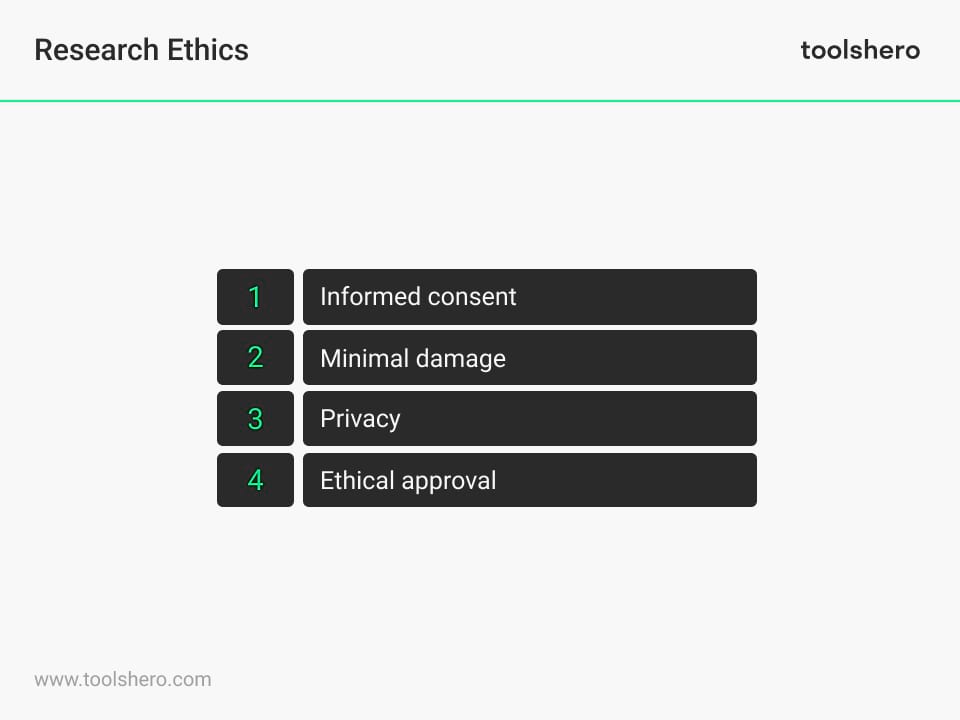Research Ethics explained

Research Ethics: this article explains the concept of research ethics in a practical way. The article begins with a general definition of the term, followed by an explanation of why ethics in research is important and which fields require a greater focus on ethics than others. Enjoy reading!
What is research ethics?
Research Ethics or Ethics in research is seen as a code of conduct based on respect for the researcher himself, for others and the environment. Ethics are governed by the principles and assumptions that underlie the way people and organizations should behave.
Research ethics involves the application of these principles to various research activities.
Some key elements you will read about in this article are:
- Research design
- Execution of the research
- Respect for society and others
- Use of resources and research results
- Scientific misconduct
- Regulation and control of research
Most people think of ethics as rules for distinguishing between right and wrong. Frequently heard related topics are the Golden Rule (treat others as one would expect to be treated themselves), the then commandments, wise sayings of Confucius or the Hippocratic Oath.
Definition of ethics
In summary, ethics can be defined as ‘standards of behavior that distinguish between acceptable and unacceptable behavior’.
Most people learn these ethical standards at home, at school, in church, or in other social settings. Moral development occurs throughout life, although most people acquire the sense of right and wrong in childhood.
Ethical standards are so widely accepted that people tend to view them as ‘common sense’. But why are there so many ethical issues in society?
Different views
Different people have different views on what is right and wrong because they understand and apply ethical standards in their own way.
Although laws regulate behavior, ethical standards are broader and more informal.
An action can be legal but considered unethical, and vice versa. Ethics are about what people consider right or wrong and can even lead to civil disobedience when people want to change unjust laws.
Different fields of Research Ethics
Ethics can also be understood as a field that studies norms of behavior, such as in philosophy, theology, law, psychology and sociology. Different disciplines, institutions and professions have their own standards of behavior that suit their objectives.
These standards help with coordination and building public trust.
Research ethics is a specialized field that applies these standards to research and scientific activities.
It is important to follow ethical standards in research because they promote truth, collaboration, and accountability, protect the public, and support other important moral values.
Research Methods For Business Students Course
A-Z guide to writing a rockstar Research Paper with a bulletproof Research Methodology!
Human subjects
A simple and common example of ethical considerations in research is the use of human subjects, such as in medical research.
Imagine a researcher wants to test a new drug to see if it is effective in treating a disease. Below are some ethical considerations made in such situations.
Informed consent
The researcher must ensure that participating patients are fully informed about the study, including potential risks and benefits, before consenting to participate. This ensures that participants voluntarily agree and understand what they are participating in.
Minimal damage
The researcher must ensure that the research does not unnecessarily harm participants. For example, if there are side effects, they should be carefully monitored and treated.
Privacy
The privacy of the participants must be protected. Medical information generally cannot be shared without consent, and results must often be reported anonymized to protect participants’ identities.
Research Ethics: the ethical approval
The study must be reviewed and approved by an ethics committee before it starts. This committee assesses whether the research meets ethical standards.
Example: torture without scientific or social benefit
An example of research that is absolutely unacceptable from an ethical point of view is research that deliberately causes harm to people or animals without any scientific or social benefit.
An example:
Imagine that a researcher decides to deliberately inflict severe pain and suffering on random people without their consent. The only reason being to observe how they react to extreme pain.
This research would cause serious physical and psychological harm to the subjects without any justified scientific purpose.
It violates all the ethical standards described above regarding human dignity, respect for people and the prevention of unnecessary harm.
Research Ethics at university
As shown in the example above, it is crucial that researchers learn about ethics early. This process of course starts in childhood, but it is discussed in more detail at university. This remains important even after graduation.
There are ethics courses. Universities offer specific courses that focus on ethics in various fields, such as medical ethics, business ethics, research ethics and more. Seminars and workshops are also popular.
Ethical issues can also be discussed in regular lectures. Teachers often use case studies to get students to think about ethical dilemmas within their field.
Ethics committees
Ethics committees, also known as ethics review boards or ethics review committees, are groups of people responsible for reviewing and approving research projects.
The purpose of these committees is to protect the rights, dignity and safety of participants in research.
These committees often consist of ethics experts, scientists, medical professionals and representatives from society.
Often the process looks something like the one described below:
Phase 1: submitting a research proposal
Researchers who plan to conduct a study involving human or animal subjects must submit a research proposal to the ethics committee of their university, hospital or organization.
Phase 2: assessment of the proposal
The ethics committee reviews the research proposal to ensure that it meets ethical standards.
They look at things like the safety of participants, the information provided to participants, and whether the research respects the well-being of participants.
Phase 3: feedback and approval
The committee can provide feedback to the researchers and request changes to the proposal to ensure it is ethical.
If the proposal meets all ethical standards, it is approved.
Phase 4: monitoring
During the study, the ethics committee often monitors to ensure that the researchers adhere to approved ethical guidelines.
Psychology and Research Ethics
In psychological research, researchers must tell participants what the research is about, what will happen, and what the possible good and bad sides are.
The participants must then say that they want to participate by signing a paper. It is important that no one is forced to participate and that they can always stop if they want.
This ensures that people participate in the study voluntarily and with understanding.
Example of non-ethical research in psychology
An example of unethical psychological research is known as the “Little Albert Experiment” conducted by John B. Watson and Rosalie Rayner.
In this experiment, a baby named Albert was exposed to loud noises and scary objects, such as a white rat, to see how he reacted.
Since Albert was a baby, he could not give consent. His mother was also not fully informed about what would happen.
After the experiment, Albert developed an intense fear of white stuffed animals and similar stimuli. This led to serious psychological damage.
After the experiment, Albert received no help to reduce his anxiety. No debriefing or follow-up was provided.
Approaches to research ethics
There are different ways to approach ethics. Some of those approaches are described below:
Deontological ethics
This is an ethical approach that dictates that some actions are right or wrong in themselves, regardless of the consequences.
As an example, lying or breaking promises are considered intrinsically wrong.
It revolves around principles as described at the beginning of this article, such as: treat others as you would like to be treated.
Consequentialist ethics
According to this approach, the rightness or wrongness of an action depends only on its consequences.
You should act to achieve the best outcome, whatever that may be.
An example of this is utilitarianism, where people strive to maximize happiness or minimize pain for as many people as possible.
Virtue ethics
This approach focuses more on personal character traits than on specific actions.
This not only concerns questions such as: what should we do?, but also: what kind of person should we be? Virtues such as courage, honesty and compassion should be emphasized.
Care ethics
This is an approach that emphasizes relationships and caring for others.
It focuses on the question how we have to take care of each other and show empathy. This is useful in situations where traditional ethical principles conflict, such as sensitive discussions about abortion.
Now it’s your turn
What do you think? Do you recognize the explanation about research ethics? Have you had to make ethical considerations when conducting your thesis, for example? Do you think ethical views change over time? Do you have any tips or comments?
Share your experience and knowledge in the comments box below.
More information
- Barick, R. (2021). Research Methods For Business Students. Retrieved 02/16/2024 from Udemy.
- Moreno, M. A., Fost, N. C., & Christakis, D. A. (2008). Research ethics in the MySpace era. Pediatrics, 121(1), 157-161. Harvard Business Review, 130-139.
- Israel, M., & Hay, I. (2006). Research ethics for social scientists. Sage.
- Oliver, P. (2010). The student’s guide to research ethics. McGraw-Hill Education (UK).
- Emanuel, E. J., Grady, C. C., Crouch, R. A., Lie, R. K., Miller, F. G., & Wendler, D. D. (Eds.). (2008). The Oxford textbook of clinical research ethics. Oxford University Press.
How to cite this article:
Janse, B. (2023). Research Ethics. Retrieved [insert date] from Toolshero: https://www.toolshero.com/research/research-ethics/
Original publication date: 09/26/2023 | Last update: 01/02/2024
Add a link to this page on your website:/
<a href=” https://www.toolshero.com/research/research-ethics/”> Toolshero: Research Ethics</a>













